The shattering choices three families faced as Hurricane Harvey slammed through their lives
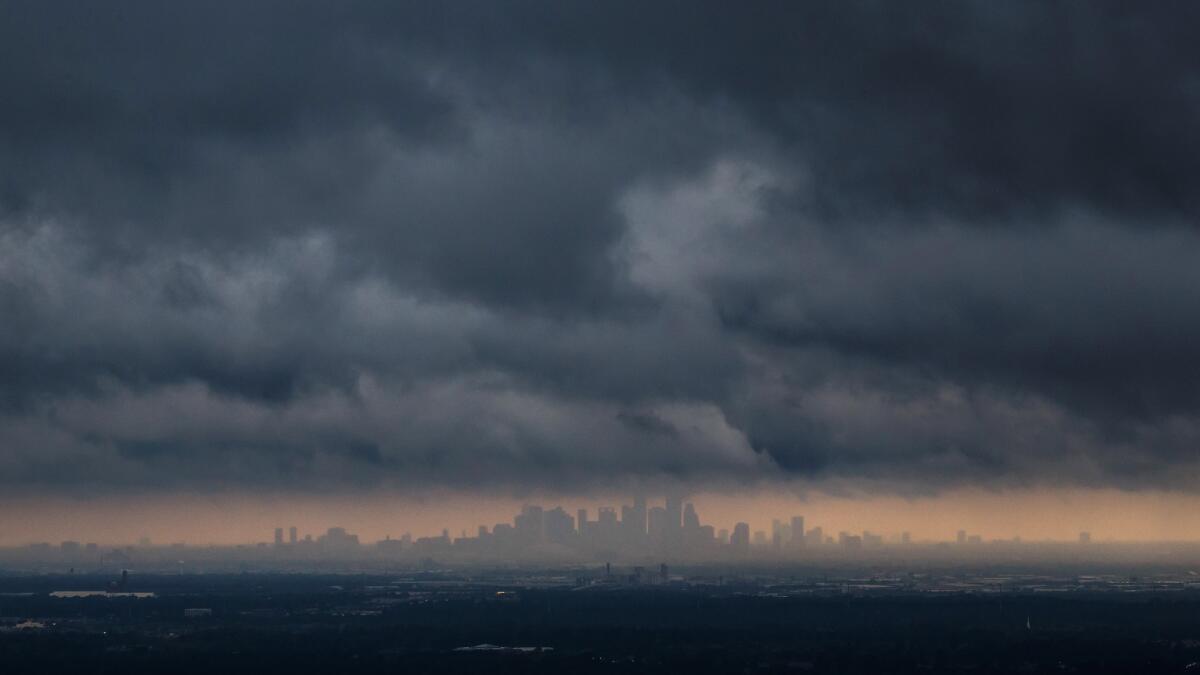
- Share via
Reporting from Houston — The road was chest-high in water, forcing the two men to slog across lawns that sloped up to brick homes.
When Andrew Pasek’s sister evacuated her house in West Houston as the flood waters crept in, she left her cat behind. Pasek and his childhood friend Sean Stuart had come to retrieve it.
Partway there, in 2 feet of water, they neared a carriage light in a yard. Pasek suddenly screamed in pain and started kicking his leg. Behind him, Stuart felt the singe of electrical current in the water.
Pasek lost his balance and grabbed the light’s metal post. He stiffened and fell in the water.
“Don’t come near me,” he shouted to Stuart. “Don’t touch me.”
::
When Hurricane Harvey swept into southeast Texas, it threatened to wipe entire neighborhoods off the grid.
In September 1900, the deadliest hurricane ever in America’s history made landfall on the Texas coast, destroying the city of Galveston. That opened the way for Houston, its similar-sized rival, to become the region’s metropolis, the fourth largest in the nation today.
Hurricane Harvey threatened to reconfigure the cityscape on this low-lying land once again.
As a Category 4 hurricane swirling off the Gulf of Mexico, its eye crossed the coast on Aug. 25, its winds ripping beach and fishing towns to pieces.
Then it stalled.
Harvey parked over the Houston area’s 6.5 million people, dumping up to 50 inches of rain
Even the slightest dips and rises on the flat coastal plain could determine which neighborhoods flooded. Residents found their fates tied to small creeks and shallow reservoirs.
The divergent experiences of three families showed the stark challenges that Houstonians faced — the hours of anxious waiting, the rumors and hyped-up news reports, the eerie creep of the water, the gurgling dark nights, the minor decisions that turn catastrophic.
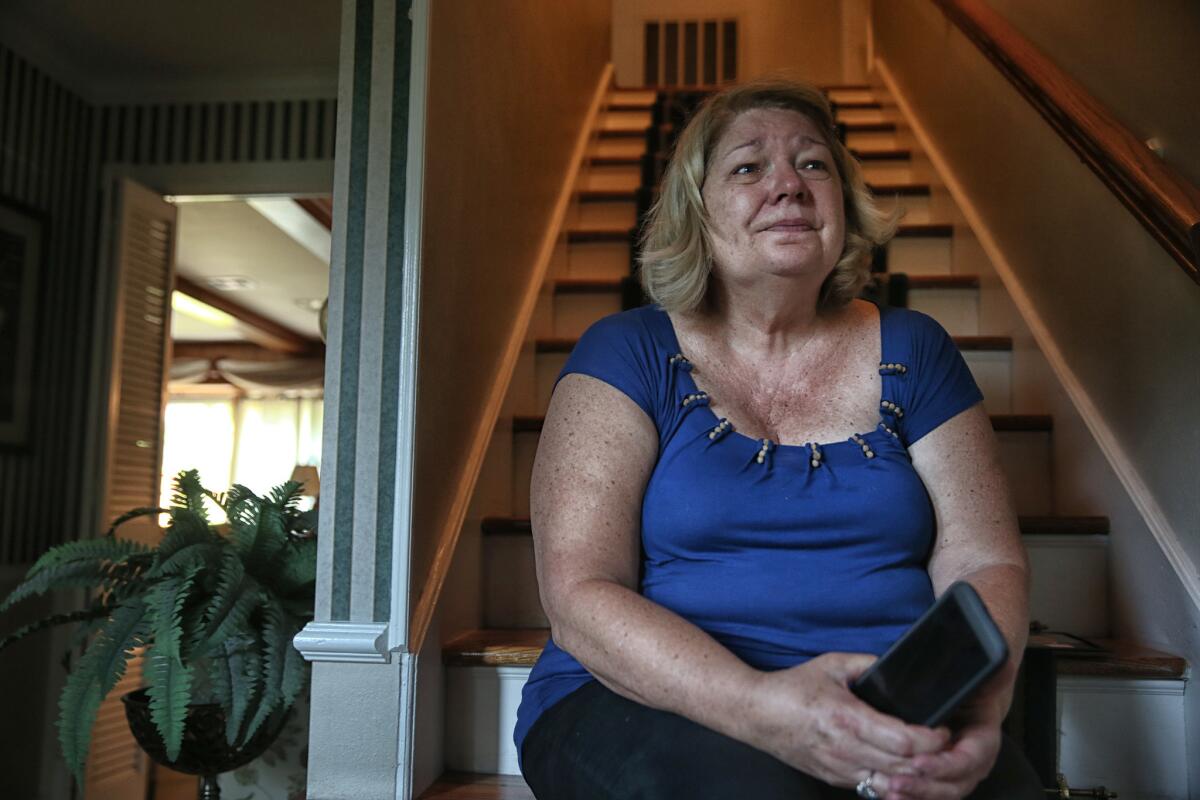
Andrew Pasek’s mother JoDell, 66, has lived in her Sherwood Oaks neighborhood in West Houston since she was a teenager, and the first big flood came in April of last year. She suspects that an adjacent subdivision of hundreds of tightly packed houses, built in the last decade on what used to be ranchland, altered the hydrology of the area.
About 30 miles to the northeast, Charles Lewis looked down on the golf course from his sunroom during the first days of the storm and watched the water flow in, confident his home in the suburb of Kingwood would be safe. He expected the torrents to flow right by and into the San Jacinto River.
The Smith family lived in a rented wood-frame home perched on a low footing of cinder blocks in East Houston. Their street, Richland Drive, was built on a triangle of swamp land between two bayous. The rain was flooding their block even before Harvey made landfall.
Yvonne Ferguson-Smith, 47, saw no easy escape. She had two teenagers and nursing shifts at a hospital she was scheduled to work.
Her sister Charmane, who has schizophrenia, was already agitated with fear of the silty deluge in the street. Neither she nor Yvonne could swim. She wanted to stay. But Yvonne’s 14-year-old son Travis begged to leave; he was scared of snakes flushed from the woods.

Yvonne Ferguson-Smith and her family return to their home that was flooded when Harvey rolled through northeast Houston.
Her boss texted her to come help storm victims. Her husband Rico said it was too dangerous. She looked out and found their two cars submerged. Work was out of the question.
But, as with millions of people, a bigger dilemma remained: Was it safer to hunker down at home no matter how miserable and dangerous conditions got, or better to strike out for higher ground? In 2005, when Hurricane Rita hit, more than 100 people died in a forced evacuation, many on the roads.
::
The night Harvey made landfall, JoDell Pasek and her husband, Al, started rolling up the carpets in the living room and hallway in their brick home on Oak Spring Drive. Rain was sluicing into the backyard like they had never seen in 34 years there.
She feared her daughter Alyssa’s house was particularly vulnerable. Several homes in that neighborhood had flooded during last spring’s storm.
The couple had planned to move in two weeks to the country in Virginia. They were already half-packed. Andrew, 25, had asked them to stay but they wanted to live their retirement dream.
He was still a sweet kid to her, an Eagle Scout who took in any stray animal he found, no matter how funny-looking or mangy. The puggle-boxer mix lolling at her feet came to her a few years back from a roadside on Andrew’s route to work in San Antonio.
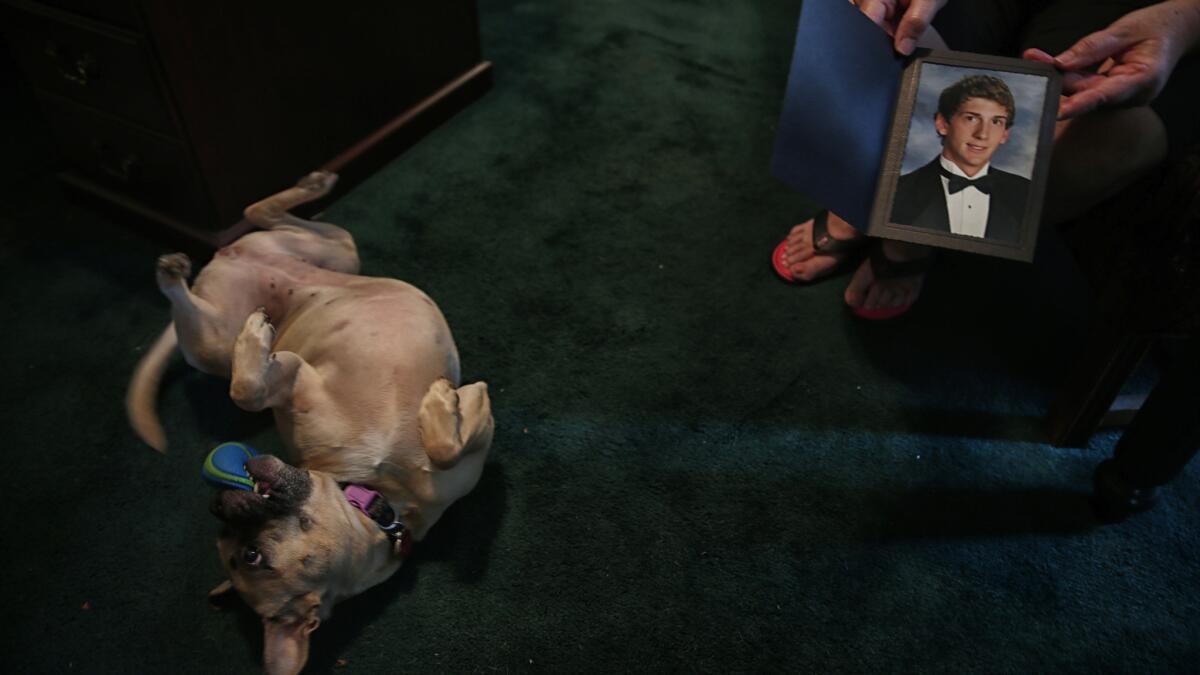
He found another puppy in high school, wandering the streets, bald but for hair on its neck — not the type that had a good chance of being adopted. He brought it home, and Alyssa fell in love with it, even before its hair grew out. She named it Coco.
JoDell loved her son’s sentimentality and took solace that he had a good job, a patio home, and a girlfriend, Allie, whom she liked.
By evening the water was at the sill of the Paseks’ back door. They grabbed buckets and began scooping.
::
In Kingwood, Charles Lewis, a FedEx operations manager and native of Jamaica, stood looking out his living room window, shocked at how much water was flowing down the street. His wife, Tina, held their 2-year-old daughter.
Charles suspected a new development to the north kept it from flowing into the creeks and diverted it here, to the Fosters Mill Estates.
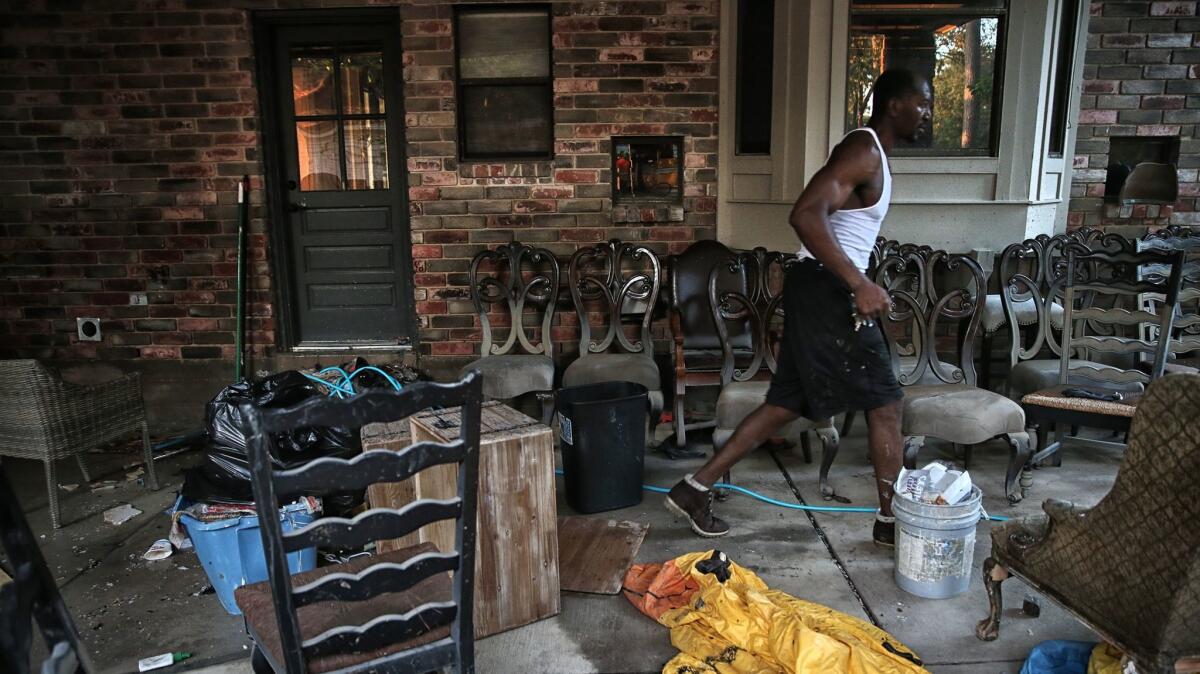
Rescue boats buzzed up and down the block, but he didn’t want to leave. His sprawling house was filled with expensive furniture and electronics. He thought the neighborhood would be a target for looters.
::
Fifteen miles south, the Smiths didn’t have the leisure to worry about looters. The storm would beat them to it. Neighbors were leaving in rescue boats, and others ferried their belongings in floating dumpsters.
The family stripped their photos from the walls and locked them in a waterproof safe. Yasmine, 13, hung her teddy bears from a curtain rod and put her pink Barbie ATM on the dresser.
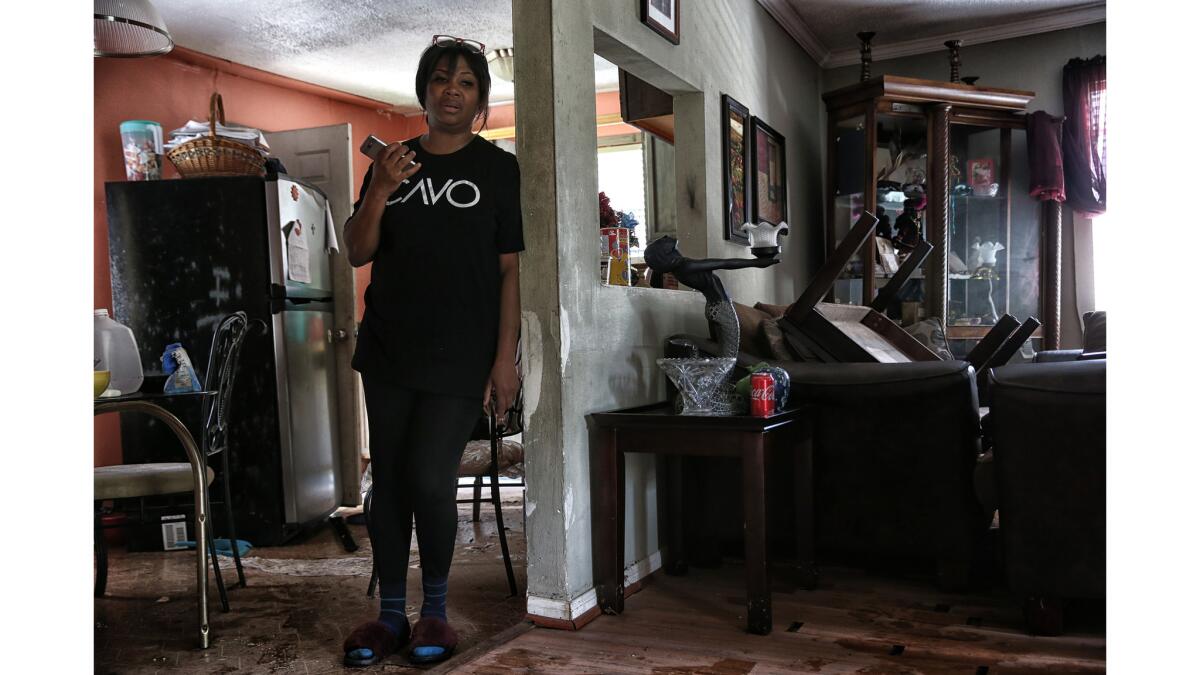
Yvonne fell in and out of sleep around 3 a.m., listening to the sputtering hum of the boats outside.
A thud woke her. She rushed into the bathroom and saw that the ceiling over the toilet had collapsed. Mushy drywall slumped on the floor.
The inevitable was coming.
Water crept up the stairs outside, then over her threshold and into her living room. A garter snake swam into Yasmine’s bedroom.
By daybreak, a foot of water had flooded the house, and the toilet wasn’t flushing.
“We got to get out of here,” Rico said.
They stepped outside in belly-high water with backpacks on their heads. Yvonne worried her sister might break down.
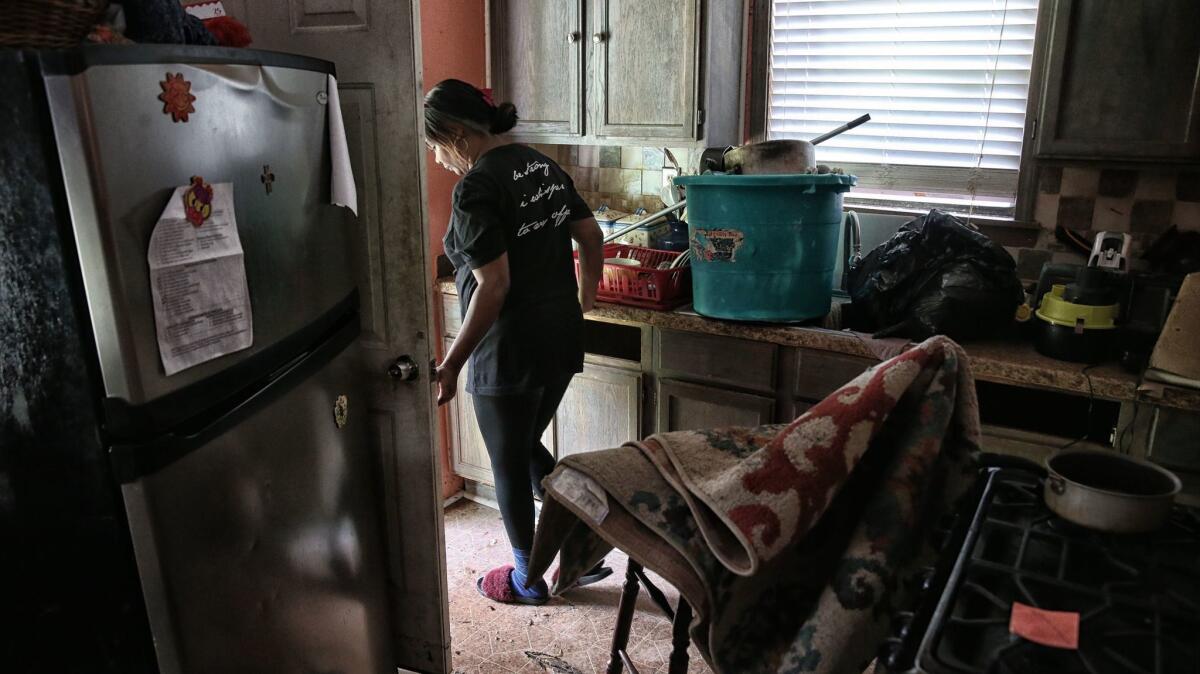
Feeling the uneven pavement with their feet, they stumbled to high ground. They passed a half-floating red BMW in the water. They reached the Family Dollar parking lot, and found a crowd waiting for a rescue truck.
When an 18-wheeler truck arrived with an open bed, the Smiths climbed in with about 50 people. The truck dropped them off at the Lakewood Baptist Church, where they dried off and waited for city buses that would carry them to the shelter at the downtown convention center.
Yvonne suddenly remembered she had not taken her mother’s ashes.
::
By Sunday night, as the tropical storm still hovered over Houston, JoDell Pasek learned that officials planned to release water from Addicks Reservoir just east of her house to ease pressure on the earthen dam.
The next morning, water came up her street in inch-high waves, like the foamy swash rolling up to the dry sand on a beach, layer upon layer, until the water was nearing her front door.
Across the reservoir, Alyssa and her fiance feared that if they stayed any longer, they’d be trapped. So they put Coco in the car. With no carrier for their giant Maine Coon cat, d’Artagnan, they put her upstairs with food and water, and promised they’d be back in a couple days.
Alyssa, knowing her mother would not approve, told her they took the cat with them.
::
In the Foster Mill Estates, Charles Lewis no longer liked the view from his sunroom. The water filled retention ponds on the golf course and was creeping up his backyard.
He walked into the rain and inspected the scene, figuring maybe he could run a hose from the side yard, and siphon the water over the hump of his driveway and into the street.
Almost instantly, that idea struck him as absurd. The water from the street met the water from the back, causing his garage door to cave in.
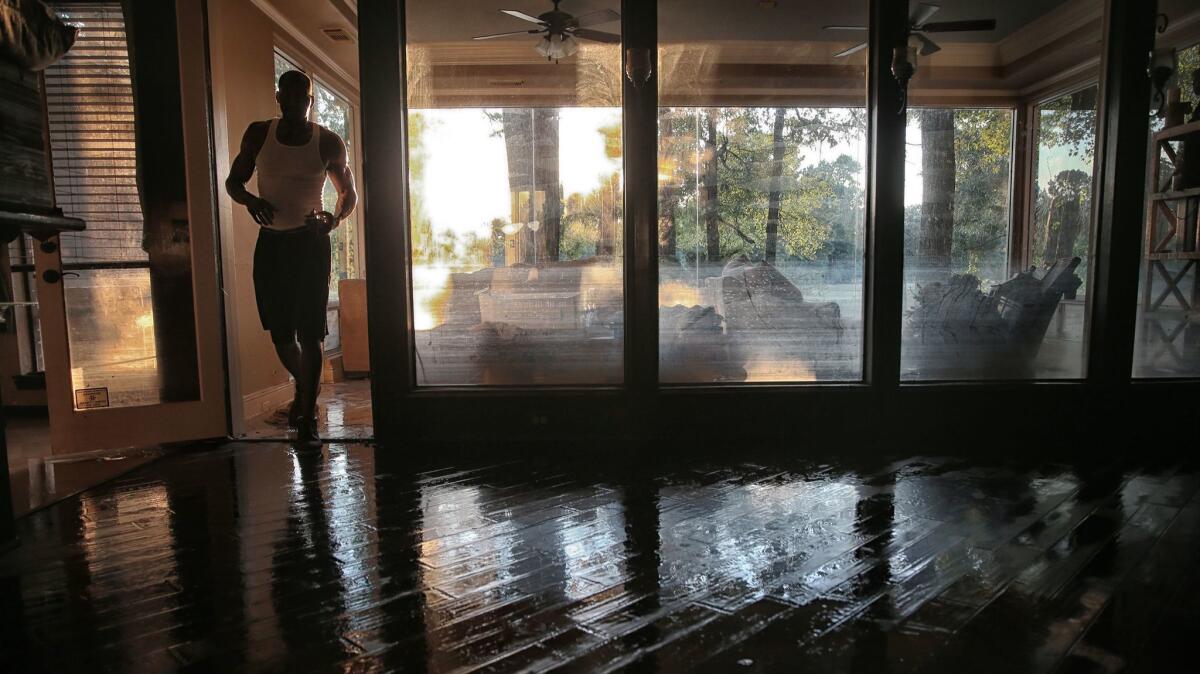
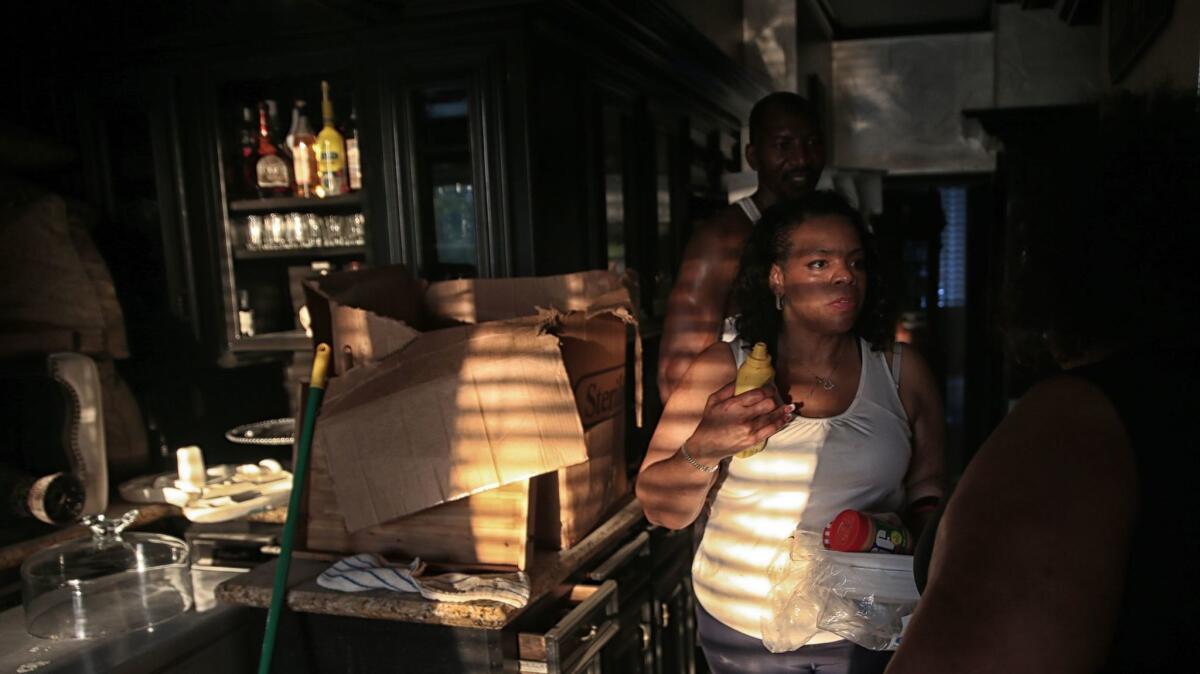
Suddenly, a manageable situation was looking ugly. The images of people on their roofs and swimming for their lives no longer felt removed.
Rescue boats kept passing by. But he didn’t want to leave. In Jamaica, you protected what you wanted to keep.
By evening, clear water was in their home and rising. They retreated to the second story as the water, almost imperceptibly slow, followed them up the stairs.
After midnight, Charles told Tina: “Honey, we have to get out of here.”
They fled on a Border Patrol boat, and stayed with Tina’s niece.
::
The rain did not stop. The storm had recharged on the gulf and landed Wednesday to the east. But the three families were safe for the time being.
On Oak Spring Drive, the water had receded without flooding the Pasek home. For the first time since Aug. 25, their roads were dry enough to drive on.
JoDell and Al motored out to get some milk, but stores were closed or out of supplies. As they stepped back inside, the phone rang.
Al spoke to Andrew, as JoDell half-listened to them.
“Don’t worry about the cat,” Al told him.
::
Downtown, the Smiths found their spot in a cavernous hall of the convention center with 10,000 other refugees. They carved out their own fort of sorts, using chairs and blankets to make low walls.
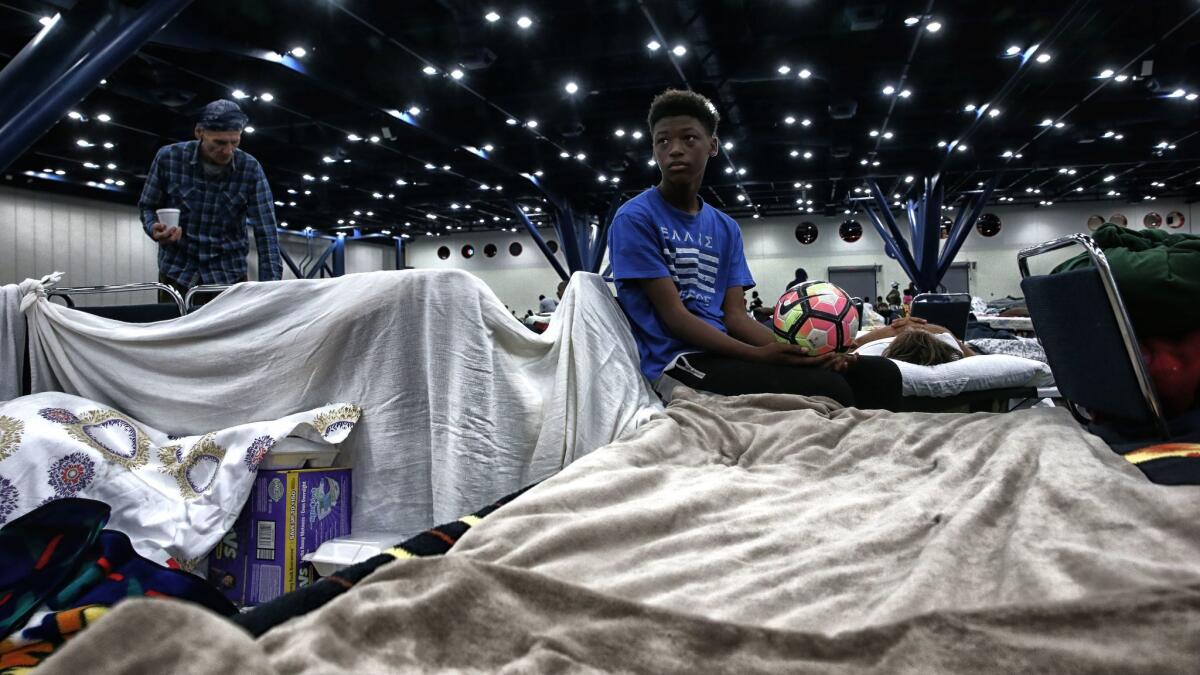
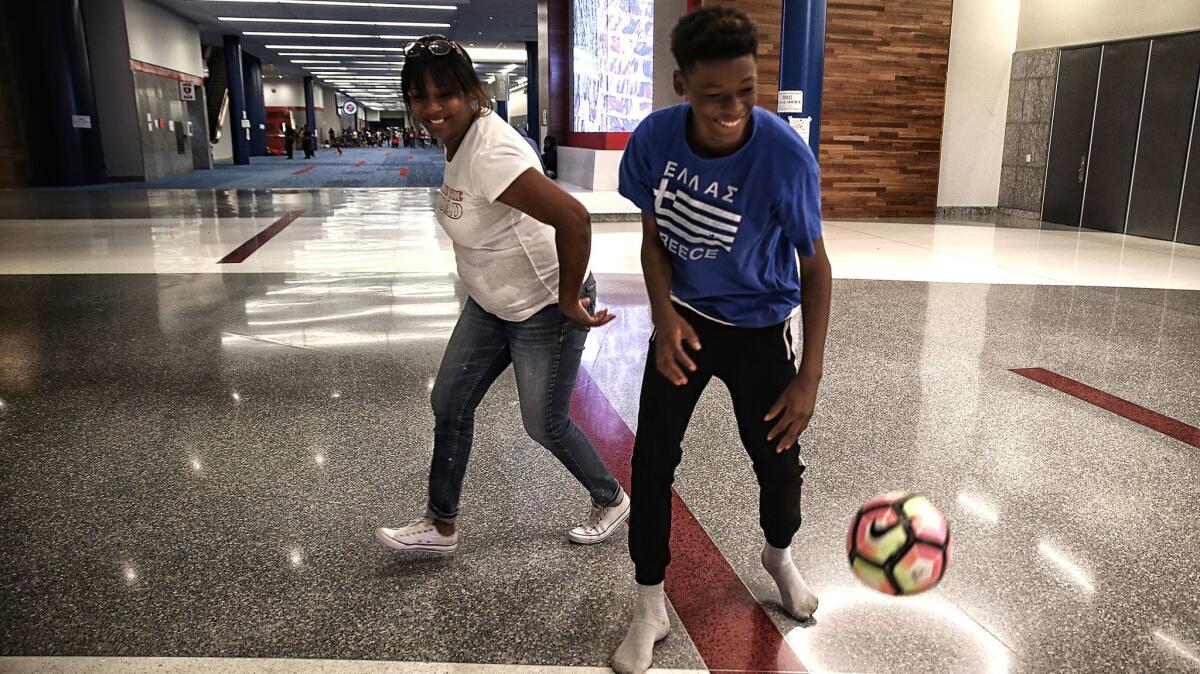
They stocked up with food, a soccer ball and donated children’s books and National Geographic magazines.
They were stricken when they heard a neighboring family’s van had washed into Greens Bayou by their house, drowning six people, including four children. Travis remembered meeting one of the girls.
“She had her quinceanera a few weeks ago,” he recalled.
They counted themselves lucky. “Things can be replaced,” Rico said.
::
At 2:45 Tuesday, JoDell Pasek got a call from her neighbor Noreen Stuart, Sean’s mother.
“JoDell, I’ve got to tell you this. Sean and Andrew were together, they were going to Alyssa’s house to check on a cat, and Andrew stepped on a live wire or something under the water and he was electrocuted.”
“What?” she gasped. “What do you mean?”
Noreen could barely speak the words.
“He’s dead.”
JoDell started screaming. Al kept asking her what was happening, and she finally blurted it out.
They had to get to Andrew. They raced toward their daughter’s house in their Chrysler, trying to find dry roads. She had never seen Al drive so fast.

JoDell Pasek’s son Andrew Pasek, 25, was electrocuted when he and a friend decided to return to Pasek’s sister’s house north of the Addicks Reservoir in Houston to rescue a cat she left behind evacuating her neighborhood.
They got to Alyssa’s neighborhood and saw Andrew’s Jeep. The police were getting everyone out of the water until the power company could turn the electricity off.
About 90 minutes passed before paramedics could get to Andrew. They carried him out in a body bag.
JoDell went to touch him.
“No ma’am, it’s protocol, you can’t be near the body. We need to bring it to the medical examiner,” she recalls one of them saying.
“I just want to put my hand on him and say goodbye.”
The couple couldn’t fathom how their lives changed so quickly. They left their house twice that day, once to get milk, then to find their dead son.
::
The slight vagaries of topography saw people in vastly different circumstances on Wednesday. Many parts of the city were dry, restaurants were opening up. Lights were on, freeways flowing.
The oak-lined streets of other neighborhoods felt like giant mangrove tunnels, cicadas buzzing, abandoned.
Charles Lewis came in a boat to get diapers, baby wipes and some of the frozen meat he kept in a deep freezer. Opening the front door sent waves through the house.
He waded in. Furniture bobbed like flotsam.
Charles took a deep sigh. It was astounding what havoc still water could wreak. He got his things and left.
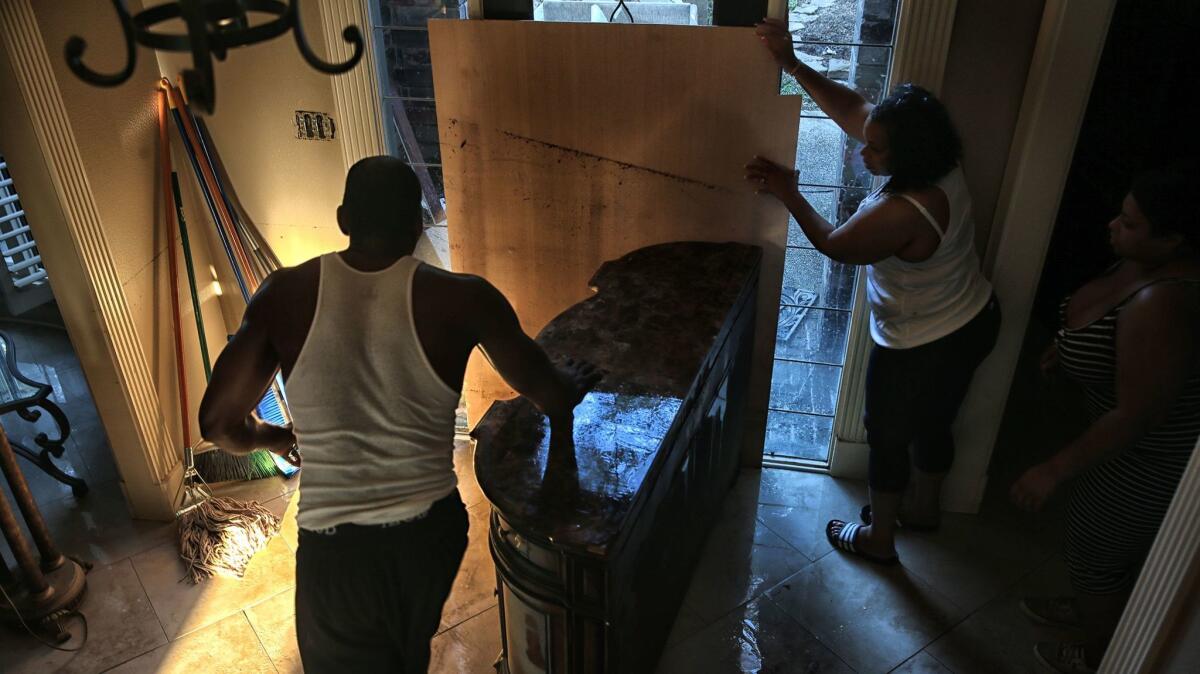
The Smiths visited home, too. The roads were dry on Richland Drive.
Yvonne found the door standing open. The laminate floors were soggy, buckled and littered with insect carcasses.
“Where did the water go?” she said.
She looked dazed as she searched through the dreck for her mother’s ashes. She spotted the gold box on top of the hutch.
“Whatever you do, don’t open the fridge,” Yasmine said.
Mold crept down the wall. The stench was too strong.
They packed up some bags, and headed back to the convention center.
::
Charles Lewis drove home the next day, not believing what he saw — dry streets. The lawns were green, if slightly brown, as were trees and hedges.

Charles Lewis thought insurance would cover his losses, but like many others, learned his policy didn’t cover floods.
His neighbors were out drying furniture in their driveways, tearing out soaked carpet and drywall. It was a communal effort: People lent tools, helped haul heavy items, swapped advice. Charles and Tina hosed out the mud and dried the floors. He thought insurance would cover his losses, but like many others, learned his policy didn’t cover floods.
He had to laugh, though, when his neighbor told him he spotted his hot tub on the golf course.
::
JoDell Pasek kept going over all the ways Andrew could still be with her.
Had he not been hit by a car skateboarding years ago and broken his ankle, he would not have had those metal pins in his legs. Did that focus the electrical current in the water? Why didn’t the power company turn the electricity off when the dams released the water?
Sadly, she’d suffered great loss before. Her oldest son, from a previous marriage, was killed in a car accident in 1993. She knew the depth and dark channels of grief.
She thought about poor d’Artagnan, still stuck in her daughter’s home as of Saturday night.
JoDell remembered how Andrew always wanted to see Mt. Rushmore. So she began planning a road trip for the whole family; they will wait until they get his ashes and hold his funeral. Sean and his little brother Wesley, Andrew’s best friend, would come. So would Andrew’s rescue dogs.
ALSO
In tale of two cities, parts of Houston survived untouched, while others begin flood cleanup
After Harvey, Texas rallies to rescue cats and dogs, with lessons learned from Hurricane Katrina
More to Read
Sign up for Essential California
The most important California stories and recommendations in your inbox every morning.
You may occasionally receive promotional content from the Los Angeles Times.












